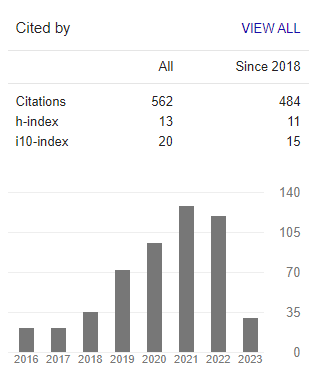THE DAILY MAIL AND THE REBIRTH OF POPULIST JOURNALISM
Abstract
This paper looks at the phenomenon of populist journalism using the Daily Mail in the UK as a case study. Borrowing the concept of mediatization from Couldry and Hepp (2017) and hybridity from Chadwick (2017), this paper elaborates populist journalism as an inseparable part of the rise of populism in various places. While the socio-political context is relatively new, the historical traces of populist journalism can be traced to the phenomenon of tabloid journalism that has emerged since the early 19th century. In other words, populist journalism is a new style of developing tabloid journalism as a consequence of structural changes in the media environment.
To cite this article (7th APA style):
Utomo, W. P. (2022). The Daily Mail and the rebirth of populist journalism. Journal Communication Spectrum: Capturing New Perspectives in Communication 12(1), 29-39. http://dx.doi.org/https://doi.org/10.36782/jcs.v12i1.2204
Keywords
References
Adams, T. (2017). Is the editor of the Daily Mail the most dangerous man in Britain? The Guardian. https://www.theguardian.com/media/2017/may/14/
Addison, A. (2017). Mail men: the unauthorized story of Daily Mail the paper that divided and conquered Britain. Atlantic Books.
Altheide, D. L. & Snow, R. P. (1979). Media logic. Sage Publications.
Anderson, C.W. (2018). Empirical failures: data journalism, cultural identity, and the Trump campaign. In Boczkowski, P. and Papacharissi Z (eds). Trump and the media, 33-39. MIT Press.
Angel, H. (2017). Even mail journalists are sick of the Daily Mail. Vice. https://www.vice.com/en_uk/article/
Asp, K. & Esaiasson, P. (1996). The Modernization of Swedish Campaign: Individualization, Profesionalization, and Medialization. In Swanson, D. L. & Mancini, P. (eds). Politics, Media and Modern Democracy: an Internatinal Study of Innovations in Electoral Campaigning and Their Consequences. Praeger.
Barnett, S. (1998). Dumbing Down or Reaching Out. In Seaton, J (ed.), Politics and the Media: Harlots and prerogatives at the turn of the millennium, 75-90. Blackwell.
Barnett, S. (2017). Daily Mail vs The Guardian: why did editor Paul Dacre lose his rag? The Conversation. https://theconversation.com/daily-mail-vs-the-guardian-why-did-editor-paul-dacre-lose-his-rag-80034
Berry, J. M., & Sobieraj, S. (2014). The outrage industry: political opinion media and the new incivility. Oxford University Press.
Bingham, A & Conboy, M. (2015). Tabloid Century: The Popular Press in Britain, 1896 to the present. Peter Lang
Boczkowski, P. & Papacharissi, Z. (2018). Trump and the media. MIT Press.
Brown, A. (2012). The shocking thing about the Mail Online's sidebar of shame. The Guardian. https://www.theguardian.com/commentisfree/2012/mar/24/mail-online-sidebar-of-shame
Chadwick, A. (2017). The hybrid media system: politics and power. Oxford University Press.
Collins, L. (2012). Mail Supremacy. New Yoker. https://www.newyorker.com/magazine/2012/04/02/mail-supremacy
Conboy, M. & Steel, J. (2010). From “We” to “Me”: The Changing construction of popular tabloid journalism. Journalism Studies, 11(4).
Cornelissen, J. (2016). Developing Propositions, a Process Model or a Typology? Addressing the challenges of writing theory without a boilerplate. Academy of Management Review. 42. https://doi.org/10.5465/amr.2016.0196.
Couldry, N. & Hepp, A. (2017). The mediated construction of reality. Polity Press.
Curran, J, Gaber, I, and Petley, J. (2019). Culture Wars: The Media and The British Left. Routledge.
Dahlgren, P. (1992). Introduction. In Dahlgren, P, and Sparks, C. (Eds), Journalism and Popular Culture, 1-23. Sage
Daremas, G., & Terzis, G. (2000). Televisualization of Politics in Greece. Gazette, 62(2), 117–131. https://doi.org/10.1177/0016549200062002003
De Maeyer, J & Trudel, D. (2017). A rebirth of populist journalism. Niemanlab. https://www.niemanlab.org/2016/12/a-rebirth-of-populist
Franklin, B. (1997). Newszak and News Media. Bloomsbury.
Fukuyama, F. (2018). The Demand for Dignity and the Politics of Resentment. Straus and Giroux.
Gaston, S., & Harrison-Evans, P. (2018). Mediating populism. Demos.
Gore, W. (2017). What's the truth behind Katie Hopkins ending her contract 'by mutual consent' with Mail Online? Independent. Https://www.independent.co.uk/voices/
Jaakkola, E. (2020). Designing conceptual articles: four approaches. AMS Review. 10. https://doi.org/10.1007/s13162-020-00161-0.
Jones, O. (2016). Chavs: The Demonization of the Working Class. Verso.
McLuhan, M. 1967. Understanding media: the extensions of man. 3rd edition. Routledge.
Molek-Kozakowska, K. (2013). Towards a pragma-linguistic framework for the study of sensationalism in news headlines. Discourse & Communication, 7, 173-197. https://doi.org/10.1177/1750481312471668.
Mouffe, C. (2018). For a Left Populism. Verso.
Narwaya, S. T. G. (2021). Discourse Analysis in the Perspective of Ernesto Laclau and Chantal Mouffe. Journal Communication Spectrum, 11(1), 1-11. http://dx.doi.org/10.36782/jcs.v1i1.2106
Noxon, E. (2017). From Tabloids to Twitter: The Galvanisation of Gossip. Journal of Publishing Culture, 7, 1-13.
Ornebring, H. & Jönsson, A. (2004). Tabloid journalism and the public sphere: a historical perspective on tabloid journalism, Journalism Studies, 5(3), 283-295.
Polletta, F & Callahan, J. (2017). Deep stories, nostalgia narratives, and fake news: Storytelling in the Trump era. American Journal of Cultural Sociology, 5(3), 392 – 408.
Revers, M. (2014). The augmented newsbeat: spatial structuring in a Twitterized news ecosystem. Media, Culture & Society, 37, 3-18. 10.1177/0163443714549085.
Revers, M. (2018). Populist journalism and the outrage industry. Week 11 [Powerpoint Slides] Reporting of Politics, University of Leeds, delivered 1 May 2018.
Robins, H. (2007). EU Migration and the propagation of a moral panic: an examination of the “other” in the Daily Mail and the Sun. MA Dissertation. Media Leeds. https://media.leeds.ac.uk/files/2012
Salmon, R. (2009). A Simulacrum of power’: intimacy and abstraction in the rhetoric of the New Journalism’. In Brake, L., Bell, B. and Finkelstein, D. (Eds.). Nineteenth Century Media and the Construction of Identities. Palgrave.
Schudson, M. (1995). The Power of News. Harvard University Press.
Schulz, W. (2004). Reconstructing mediatization as an analytical concept. European Journal of Communication. 19(1), 87–101.
Singer, J. B. (2005). The political j-blogger: ‘Normalizing’ a new media form to fit old norms and practices. Journalism, 6(2), 173–198. https://doi.org/10.1177/1464884905051009
Sparks, C. and Tulloch, J. (2000). Tabloid Tales. Global debates over media standards. Rowman & Littlefield.
van Dijk, T. A. (1993). Elite discourse and racism. SAGE Publications, Inc., https://dx.doi.org/10.4135/9781483326184
Waisbord, S, Tucker, T, & Lichtenheld, Z. (2018). Trump and the Great Disruption in Public Communication. In Boczkowski, P. and Papacharissi, Z. (eds), Trump and the media, 25-32 MIT Press.
Refbacks
- There are currently no refbacks.

This work is licensed under a Creative Commons Attribution 3.0 License.
Indexed by:
Archived in:
Listed in:
INTERNATIONAL ASSOCIATION FOR MEDIA AND COMMUNICATION RESEARCH

















